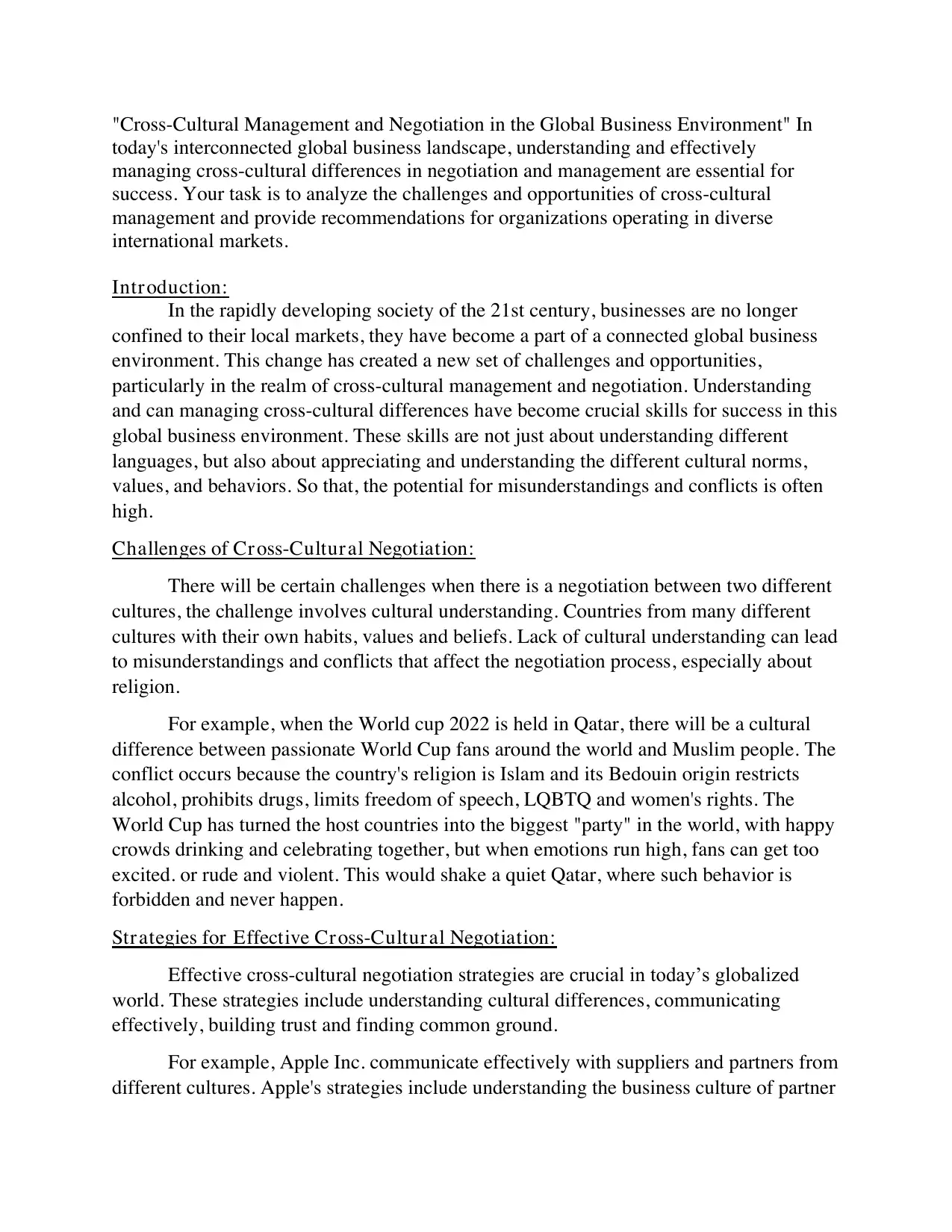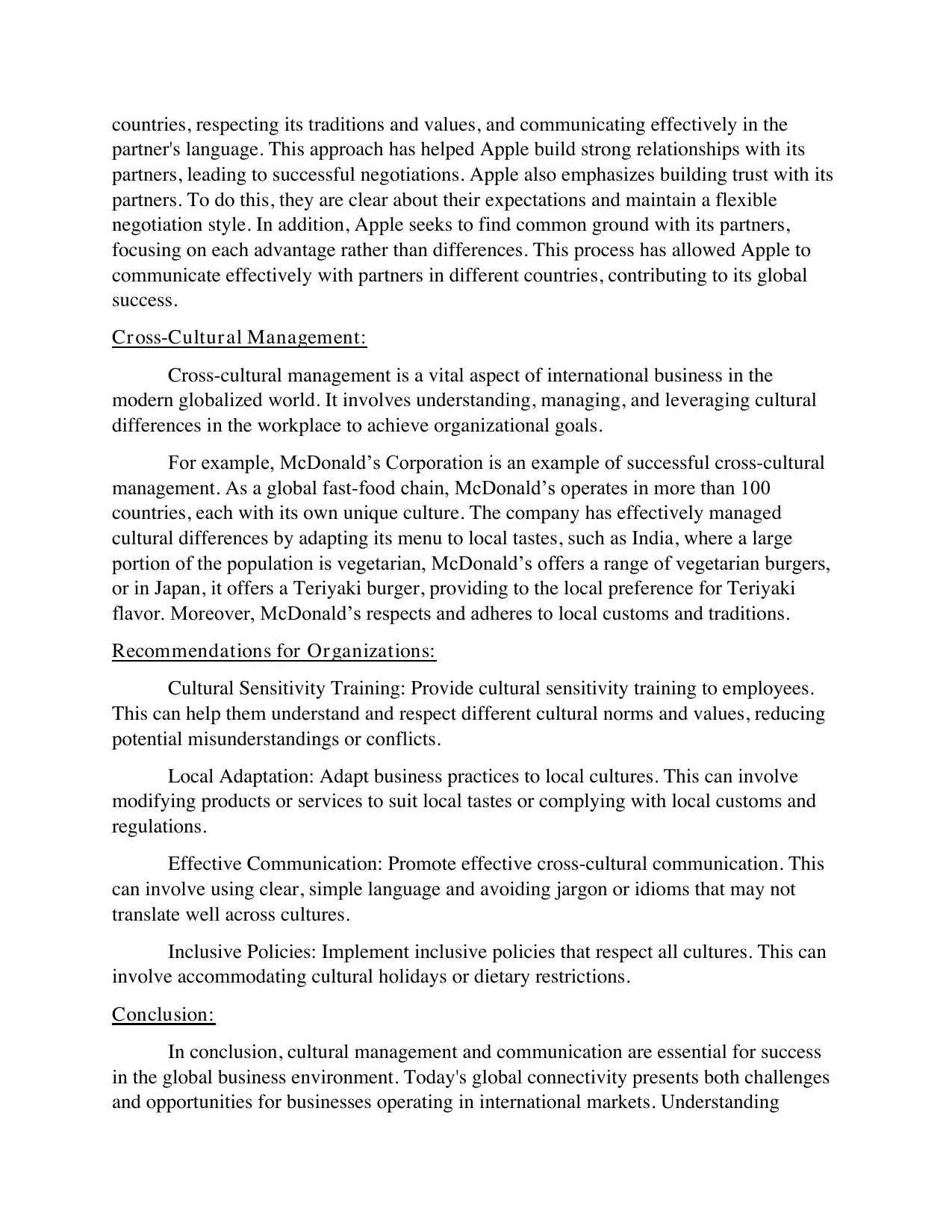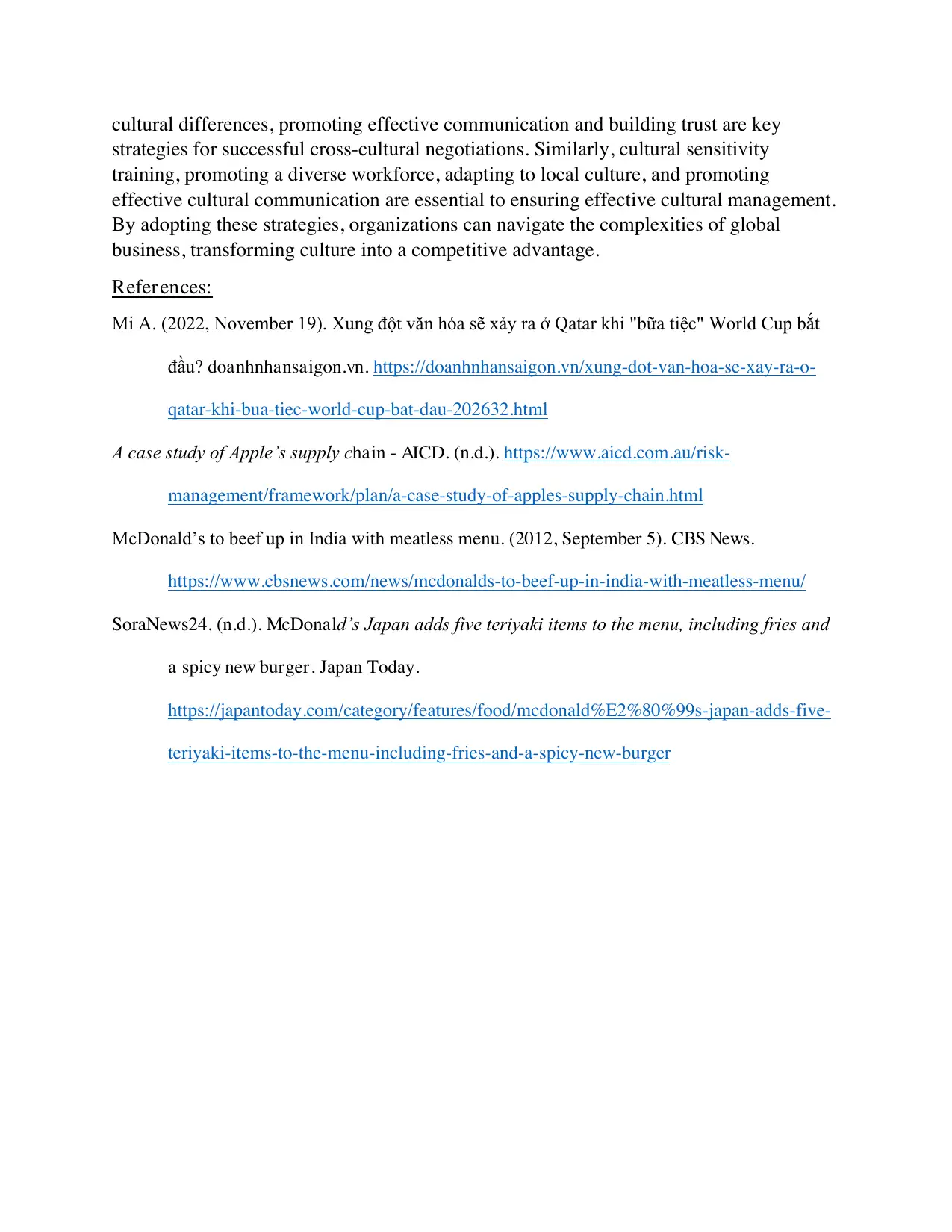Cross-Cultural Management and Negotiation in the Global Arena
VerifiedAdded on 2024/07/04
|3
|993
|74
Essay
AI Summary
This essay explores the critical role of cross-cultural management and negotiation in today's interconnected global business environment. It identifies challenges such as cultural misunderstandings and conflicting values, using examples like the 2022 World Cup in Qatar to illustrate potential cultural clashes. The solution provides effective strategies for cross-cultural negotiation, including understanding cultural differences, effective communication, and building trust, referencing Apple Inc.'s successful partnerships as an example. It also highlights the importance of cross-cultural management, with McDonald's Corporation as a case study for adapting to local tastes and customs. The essay concludes with recommendations for organizations, such as cultural sensitivity training, local adaptation of business practices, and inclusive policies, emphasizing that by adopting these strategies, businesses can transform culture into a competitive advantage. Desklib provides more solved assignments and past papers for students.

"Cross-Cultural Management and Negotiation in the Global Business Environment" In
today's interconnected global business landscape, understanding and effectively
managing cross-cultural differences in negotiation and management are essential for
success. Your task is to analyze the challenges and opportunities of cross-cultural
management and provide recommendations for organizations operating in diverse
international markets.
Introduction:
In the rapidly developing society of the 21st century, businesses are no longer
confined to their local markets, they have become a part of a connected global business
environment. This change has created a new set of challenges and opportunities,
particularly in the realm of cross-cultural management and negotiation. Understanding
and can managing cross-cultural differences have become crucial skills for success in this
global business environment. These skills are not just about understanding different
languages, but also about appreciating and understanding the different cultural norms,
values, and behaviors. So that, the potential for misunderstandings and conflicts is often
high.
Challenges of Cross-Cultural Negotiation:
There will be certain challenges when there is a negotiation between two different
cultures, the challenge involves cultural understanding. Countries from many different
cultures with their own habits, values and beliefs. Lack of cultural understanding can lead
to misunderstandings and conflicts that affect the negotiation process, especially about
religion.
For example, when the World cup 2022 is held in Qatar, there will be a cultural
difference between passionate World Cup fans around the world and Muslim people. The
conflict occurs because the country's religion is Islam and its Bedouin origin restricts
alcohol, prohibits drugs, limits freedom of speech, LQBTQ and women's rights. The
World Cup has turned the host countries into the biggest "party" in the world, with happy
crowds drinking and celebrating together, but when emotions run high, fans can get too
excited. or rude and violent. This would shake a quiet Qatar, where such behavior is
forbidden and never happen.
Strategies for Effective Cross-Cultural Negotiation:
Effective cross-cultural negotiation strategies are crucial in today’s globalized
world. These strategies include understanding cultural differences, communicating
effectively, building trust and finding common ground.
For example, Apple Inc. communicate effectively with suppliers and partners from
different cultures. Apple's strategies include understanding the business culture of partner
today's interconnected global business landscape, understanding and effectively
managing cross-cultural differences in negotiation and management are essential for
success. Your task is to analyze the challenges and opportunities of cross-cultural
management and provide recommendations for organizations operating in diverse
international markets.
Introduction:
In the rapidly developing society of the 21st century, businesses are no longer
confined to their local markets, they have become a part of a connected global business
environment. This change has created a new set of challenges and opportunities,
particularly in the realm of cross-cultural management and negotiation. Understanding
and can managing cross-cultural differences have become crucial skills for success in this
global business environment. These skills are not just about understanding different
languages, but also about appreciating and understanding the different cultural norms,
values, and behaviors. So that, the potential for misunderstandings and conflicts is often
high.
Challenges of Cross-Cultural Negotiation:
There will be certain challenges when there is a negotiation between two different
cultures, the challenge involves cultural understanding. Countries from many different
cultures with their own habits, values and beliefs. Lack of cultural understanding can lead
to misunderstandings and conflicts that affect the negotiation process, especially about
religion.
For example, when the World cup 2022 is held in Qatar, there will be a cultural
difference between passionate World Cup fans around the world and Muslim people. The
conflict occurs because the country's religion is Islam and its Bedouin origin restricts
alcohol, prohibits drugs, limits freedom of speech, LQBTQ and women's rights. The
World Cup has turned the host countries into the biggest "party" in the world, with happy
crowds drinking and celebrating together, but when emotions run high, fans can get too
excited. or rude and violent. This would shake a quiet Qatar, where such behavior is
forbidden and never happen.
Strategies for Effective Cross-Cultural Negotiation:
Effective cross-cultural negotiation strategies are crucial in today’s globalized
world. These strategies include understanding cultural differences, communicating
effectively, building trust and finding common ground.
For example, Apple Inc. communicate effectively with suppliers and partners from
different cultures. Apple's strategies include understanding the business culture of partner
Paraphrase This Document
Need a fresh take? Get an instant paraphrase of this document with our AI Paraphraser

countries, respecting its traditions and values, and communicating effectively in the
partner's language. This approach has helped Apple build strong relationships with its
partners, leading to successful negotiations. Apple also emphasizes building trust with its
partners. To do this, they are clear about their expectations and maintain a flexible
negotiation style. In addition, Apple seeks to find common ground with its partners,
focusing on each advantage rather than differences. This process has allowed Apple to
communicate effectively with partners in different countries, contributing to its global
success.
Cross-Cultural Management:
Cross-cultural management is a vital aspect of international business in the
modern globalized world. It involves understanding, managing, and leveraging cultural
differences in the workplace to achieve organizational goals.
For example, McDonald’s Corporation is an example of successful cross-cultural
management. As a global fast-food chain, McDonald’s operates in more than 100
countries, each with its own unique culture. The company has effectively managed
cultural differences by adapting its menu to local tastes, such as India, where a large
portion of the population is vegetarian, McDonald’s offers a range of vegetarian burgers,
or in Japan, it offers a Teriyaki burger, providing to the local preference for Teriyaki
flavor. Moreover, McDonald’s respects and adheres to local customs and traditions.
Recommendations for Organizations:
Cultural Sensitivity Training: Provide cultural sensitivity training to employees.
This can help them understand and respect different cultural norms and values, reducing
potential misunderstandings or conflicts.
Local Adaptation: Adapt business practices to local cultures. This can involve
modifying products or services to suit local tastes or complying with local customs and
regulations.
Effective Communication: Promote effective cross-cultural communication. This
can involve using clear, simple language and avoiding jargon or idioms that may not
translate well across cultures.
Inclusive Policies: Implement inclusive policies that respect all cultures. This can
involve accommodating cultural holidays or dietary restrictions.
Conclusion:
In conclusion, cultural management and communication are essential for success
in the global business environment. Today's global connectivity presents both challenges
and opportunities for businesses operating in international markets. Understanding
partner's language. This approach has helped Apple build strong relationships with its
partners, leading to successful negotiations. Apple also emphasizes building trust with its
partners. To do this, they are clear about their expectations and maintain a flexible
negotiation style. In addition, Apple seeks to find common ground with its partners,
focusing on each advantage rather than differences. This process has allowed Apple to
communicate effectively with partners in different countries, contributing to its global
success.
Cross-Cultural Management:
Cross-cultural management is a vital aspect of international business in the
modern globalized world. It involves understanding, managing, and leveraging cultural
differences in the workplace to achieve organizational goals.
For example, McDonald’s Corporation is an example of successful cross-cultural
management. As a global fast-food chain, McDonald’s operates in more than 100
countries, each with its own unique culture. The company has effectively managed
cultural differences by adapting its menu to local tastes, such as India, where a large
portion of the population is vegetarian, McDonald’s offers a range of vegetarian burgers,
or in Japan, it offers a Teriyaki burger, providing to the local preference for Teriyaki
flavor. Moreover, McDonald’s respects and adheres to local customs and traditions.
Recommendations for Organizations:
Cultural Sensitivity Training: Provide cultural sensitivity training to employees.
This can help them understand and respect different cultural norms and values, reducing
potential misunderstandings or conflicts.
Local Adaptation: Adapt business practices to local cultures. This can involve
modifying products or services to suit local tastes or complying with local customs and
regulations.
Effective Communication: Promote effective cross-cultural communication. This
can involve using clear, simple language and avoiding jargon or idioms that may not
translate well across cultures.
Inclusive Policies: Implement inclusive policies that respect all cultures. This can
involve accommodating cultural holidays or dietary restrictions.
Conclusion:
In conclusion, cultural management and communication are essential for success
in the global business environment. Today's global connectivity presents both challenges
and opportunities for businesses operating in international markets. Understanding

cultural differences, promoting effective communication and building trust are key
strategies for successful cross-cultural negotiations. Similarly, cultural sensitivity
training, promoting a diverse workforce, adapting to local culture, and promoting
effective cultural communication are essential to ensuring effective cultural management.
By adopting these strategies, organizations can navigate the complexities of global
business, transforming culture into a competitive advantage.
References:
Mi A. (2022, November 19). Xung đột văn hóa sẽ xảy ra ở Qatar khi "bữa tiệc" World Cup bắt
đầu? doanhnhansaigon.vn. https://doanhnhansaigon.vn/xung-dot-van-hoa-se-xay-ra-o-
qatar-khi-bua-tiec-world-cup-bat-dau-202632.html
A case study of Apple’s supply chain - AICD. (n.d.). https://www.aicd.com.au/risk-
management/framework/plan/a-case-study-of-apples-supply-chain.html
McDonald’s to beef up in India with meatless menu. (2012, September 5). CBS News.
https://www.cbsnews.com/news/mcdonalds-to-beef-up-in-india-with-meatless-menu/
SoraNews24. (n.d.). McDonald’s Japan adds five teriyaki items to the menu, including fries and
a spicy new burger. Japan Today.
https://japantoday.com/category/features/food/mcdonald%E2%80%99s-japan-adds-five-
teriyaki-items-to-the-menu-including-fries-and-a-spicy-new-burger
strategies for successful cross-cultural negotiations. Similarly, cultural sensitivity
training, promoting a diverse workforce, adapting to local culture, and promoting
effective cultural communication are essential to ensuring effective cultural management.
By adopting these strategies, organizations can navigate the complexities of global
business, transforming culture into a competitive advantage.
References:
Mi A. (2022, November 19). Xung đột văn hóa sẽ xảy ra ở Qatar khi "bữa tiệc" World Cup bắt
đầu? doanhnhansaigon.vn. https://doanhnhansaigon.vn/xung-dot-van-hoa-se-xay-ra-o-
qatar-khi-bua-tiec-world-cup-bat-dau-202632.html
A case study of Apple’s supply chain - AICD. (n.d.). https://www.aicd.com.au/risk-
management/framework/plan/a-case-study-of-apples-supply-chain.html
McDonald’s to beef up in India with meatless menu. (2012, September 5). CBS News.
https://www.cbsnews.com/news/mcdonalds-to-beef-up-in-india-with-meatless-menu/
SoraNews24. (n.d.). McDonald’s Japan adds five teriyaki items to the menu, including fries and
a spicy new burger. Japan Today.
https://japantoday.com/category/features/food/mcdonald%E2%80%99s-japan-adds-five-
teriyaki-items-to-the-menu-including-fries-and-a-spicy-new-burger
⊘ This is a preview!⊘
Do you want full access?
Subscribe today to unlock all pages.

Trusted by 1+ million students worldwide
1 out of 3
Related Documents
Your All-in-One AI-Powered Toolkit for Academic Success.
+13062052269
info@desklib.com
Available 24*7 on WhatsApp / Email
![[object Object]](/_next/static/media/star-bottom.7253800d.svg)
Unlock your academic potential
Copyright © 2020–2026 A2Z Services. All Rights Reserved. Developed and managed by ZUCOL.





